I. Overview
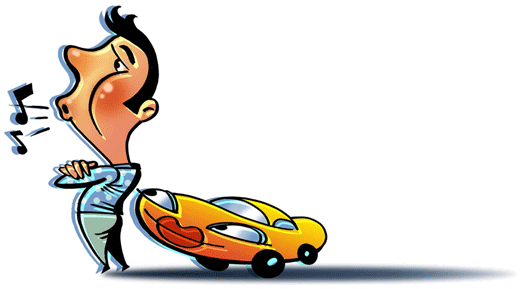
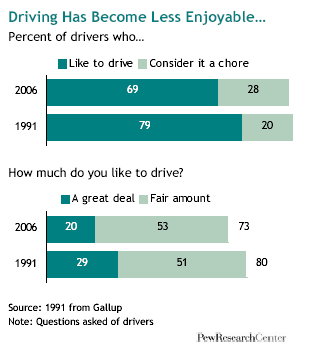 Any nation with more passenger vehicles than licensed drivers has a pretty serious love affair with the automobile. But the romance seems to be cooling off a bit — a casualty of its own intensity.
Any nation with more passenger vehicles than licensed drivers has a pretty serious love affair with the automobile. But the romance seems to be cooling off a bit — a casualty of its own intensity.
Today 69% of American drivers say they like to drive, down from 79% in a 1991 Gallup survey. And just 23% say they consider their car “something special — more than just a way to get around,” barely half of the 43% who felt this way in 1991.
The biggest reason for the cooling of the affair isn’t the recent spike in gas prices. Rather, it appears to be the result of a longer term trend — the growing hassle of traffic congestion, according to a Pew Research Center telephone survey among a nationally representative sample of 1,182 adults (including 1,048 drivers) conducted from June 20 through July 16, 2006.
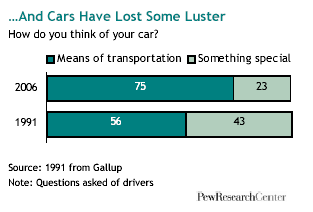 When asked whether they like to drive or consider it a chore, 69% of drivers in the Pew survey said the former, while 28% said the latter. When the “chore” respondents were asked why they felt this way, traffic congestion (23%) and “other drivers” (14%) topped the list of reasons. Just 3% cited the expense.
When asked whether they like to drive or consider it a chore, 69% of drivers in the Pew survey said the former, while 28% said the latter. When the “chore” respondents were asked why they felt this way, traffic congestion (23%) and “other drivers” (14%) topped the list of reasons. Just 3% cited the expense.
Among the still sizable majority who say they like to drive, the biggest reasons offered were the relaxation (21%), the scenery (19%), the freedom (14%) and the ability to get around (12%).
A Plague of Traffic
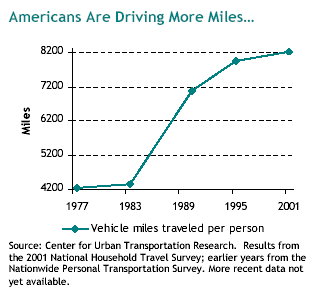 Trends from the U.S. Bureau of Transportation Statistics and the National Center for Transit Research show why, for a growing number of Americans, cars and driving seem to have become too-much-of-a-good-thing.
Trends from the U.S. Bureau of Transportation Statistics and the National Center for Transit Research show why, for a growing number of Americans, cars and driving seem to have become too-much-of-a-good-thing.
The National Household Travel Survey found in 2001 that, for the first time since such studies have been conducted, there were more personal vehicles (204 million) than licensed drviers (191 million) in this country. With all those cars, trucks, minivans and SUVs at their disposal, Americans have been making more trips and traveling more miles, thereby generating more of the very thing that has made them enjoy driving less – traffic jams.1 From 1991 to 2003, the amount of time per year that the typical Amercian spent stuck in traffic grew by 56%, according to the Bureau of Transportation Statistics.
The Car: Where Life Happens
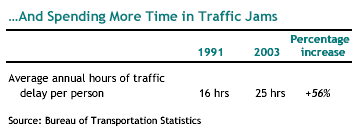 However, despite the growing hassles of traffic, many drivers have strong feelings of intimacy toward their cars – 31%, for example, say they think of their car as having a personality. And despite the high price of gas, more than a quarter (27%) say they went driving “just for the fun of it” in the past week.
However, despite the growing hassles of traffic, many drivers have strong feelings of intimacy toward their cars – 31%, for example, say they think of their car as having a personality. And despite the high price of gas, more than a quarter (27%) say they went driving “just for the fun of it” in the past week.
Moreover, most people see driving as a chance to take care of many of the other routines and amusements of daily living. Here is a (slightly scary) list of things people report having done in the past year while they were behind the wheel:
- More than two-thirds (68%) of drivers say they have sung aloud while driving.
- Roughly six-in-ten (58%) have talked on a handheld phone while driving.
- More than four-in-ten (41%) have eaten a meal while driving.
- One-in-six (16%) have combed their hair or applied makeup while driving.
- Some 6% have read a paper, book or magazine while driving.
- Some 6% have fallen asleep while driving.
- And 38% have cursed at another driver.
About the Survey
Results for this survey are based on telephone interviews conducted with a nationally representative sample of adults, ages 18 years and older, living in continental U.S. telephone households.
- Interviews conducted June 20-July 16, 2006
- 1,182 interviews of which 1,048 were conducted with drivers.
- Margin of sampling error is plus or minus 3.1 percentage points for results based on the total sample at the 95% confidence level and 3.3 percentage points for results based on all drivers. The margin of sampling error is higher for results based on subgroups of respondents.
Survey interviews conducted under the direction of Princeton Survey Research Associates International. Interviews were conducted in English and Spanish.
Bear in mind that question wording and practical difficulties in conducting surveys can introduce error or bias in the findings of opinion polls.


